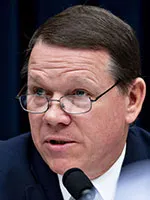Senior Reporter
Oversight to Dominate House Republicans’ Agenda in 2023

[Stay on top of transportation news: Get TTNews in your inbox.]
An in-depth examination of the Biden administration’s funding priorities and policy proposals is expected to be the focus of House Republicans in leadership roles in 2023.
The GOP caucus, tasked with governing in the majority after the November midterms, anticipates dozens of oversight hearings over the coming months. These hearings are likely to feature senior administration officials and produce audits of the White House’s legislative record. Matters related to the implementation of the $1 trillion Infrastructure Investment and Jobs Act will top the list for Republicans’ transportation agenda. House Democrats will govern in the minority as of January.
“Over the last two years of Democrats’ one-party rule in Washington, House Democrats have not lifted a finger to engage in oversight and accountability of the Biden administration’s actions and abuses of power. The American people responded this fall by electing a Republican majority in the House of Representatives to stand up for their interests,” Rep. Kevin McCarthy (R-Calif.), his party’s leader vying for the speakership, said in December.
“Our majority will have the obligation and authority to conduct rigorous oversight of the federal government, including using the government’s vast power to attempt to coerce private businesses to act against the freedoms and security of our citizens,” McCarthy added. “We will leave no stone unturned in order to deliver the accountability the American people deserve. Too many decision points in the government are made by agency heads and implemented by unelected and unconfirmed government actors — all of whom need to be accountable to the American people. And with gavels and subpoena authority in the upcoming Congress, we will use interviews, subpoenas, depositions and hearings to expose the truth.”

Capito
Certain guidance from the U.S. Department of Transportation linked to the infrastructure law’s implementation already has raised concerns among Republican policymakers in the House and the Senate. At issue is a Dec. 16, 2021, memorandum from the Federal Highway Administration suggesting state agencies prioritize maintenance of projects over proceeding with new projects. A recent review of the memo by the Government Accountability Office prompted Sen. Shelley Moore Capito (R-W.Va.) to challenge the FHWA on a technicality.
“The GAO confirmed what we have been pointing out for the past year: in its December 2021 memo, the Federal Highway Administration went beyond simply restating existing legal requirements for states — it expressed a policy preference and took steps to implement that preference,” Capito said Dec. 15. She is the ranking member on the Environment and Public Works Committee.
She added, “The Infrastructure Investment and Jobs Act was crafted and negotiated in a purposeful way, but through memos and guidance documents issued to states the administration has since attempted to contradict the law and impose policies that were specifically left out of the law.”
The senator continued, “I plan to introduce a Congressional Review Act resolution of disapproval to ensure the IIJA is implemented as written, our states have the flexibility we provided them, and we maximize the investments made in America’s highways, roads and bridges.”
The House transportation panel under GOP rule is expected to follow Capito’s lead.

Graves
“The FHWA memo goes far beyond mere ‘guidance’ from the administration. Since IIJA was signed into law, the administration has repeatedly doubled down on discouraging states from expanding or building new roads they may need, despite this policy being in direct conflict with what Congress intended,” Rep. Sam Graves (R-Mo.) said Dec. 15. He is the ranking member on the House transportation committee.
After the midterms, Senate Democrats held onto control of that chamber with a slight majority. They have echoed the Biden administration’s defense of the FHWA memo’s guidance, and plan on holding firm on policy that pre-emptively addresses freight concerns, pursues preventive infrastructure maintenance and repairs existing projects.
“I believe it’s critical to find the balance between achieving our policy goals while also providing long-term certainty so that businesses can engage profitably,” Sen. Tom Carper (D-Del.), chairman of the EPW panel, said in November. “I also believe that we will make more progress in advancing our national goals if we allow the private sector to participate fully and constructively, driving behavior across industry and leveraging our federal funding with private investment to achieve the greatest possible outcome.”

Dingell and Latta
Expanding access to autonomous vehicles also will dominate transportation debates during the new session of Congress. Reps. Debbie Dingell (D-Mich.) and Bob Latta (R-Ohio), who together launched the Congressional Autonomous Vehicle Caucus, have been longtime advocates for applying autonomous technologies in the national transportation arena.
Latta, a member of the Energy and Commerce panel with Dingell, has sponsored legislation targeting autonomous-centric policies.
“For generations, the United States has paved the way in innovative vehicle technology. Autonomous vehicles are the next step forward,” he recently said. “In order for this technology to succeed, we must educate, advocate and create a framework to implement their use.”
Latta’s autonomous vehicle legislation aims to establish a federal framework for helping agencies and industries to deploy autonomous vehicles. The Safely Ensuring Lives Future Deployment and Research in Vehicle Evolution (SELF DRIVE) Act is on the GOP’s radar for consideration in the House as early as 2023.

Pallone
House Republican leaders also expressed interest in pursuing an energy and environment package, as early as January. The legislation, expected to be advanced by the Energy and Commerce Committee’s Republican leader, Cathy McMorris Rodgers of Washington, aims to facilitate access to domestic fossil fuel production. Rep. Frank Pallone (D-N.J.), selected by his caucus to serve as ranking member of the Energy and Commerce panel for the next two years, will push back on such efforts.
“I look forward to continuing to work closely with all my colleagues to build on our efforts to lower costs for American families, bolster our economy, combat the climate crisis, and protect consumers,” Pallone said Dec. 13. “I am also committed to ensuring that the legislative achievements of the past two years are being implemented by the administration as we intended and will aggressively oppose any Republican efforts to undermine them in any way.”
An in-depth examination of the Biden administration’s funding priorities and policy proposals is expected to be the focus of House Republicans in leadership roles in 2023.
Want more news? Listen to today's daily briefing above or go here for more info
Related to transportation affairs, House Republicans announced plans to probe Department of Homeland Security Secretary Alejandro Mayorkas’ management of the southern border. That area is a key freight corridor. McCarthy has called on Mayorkas to resign, a move rejected by Democrats.
“It is simply unjust for House Republicans to blame the secretary — and by extension the DHS workforce — for problems that are being continuously perpetuated by Republican intransigence,” Appropriations Committee Chairwoman Rosa DeLauro (D-Conn.) and Homeland Security Appropriations Subcommittee Chairwoman Lucille Roybal-Allard (D-Calif.) said in November. “It is unjust for House Republicans to once again engage in political theatrics instead of working with Democrats to address the many challenges facing the American people.”




